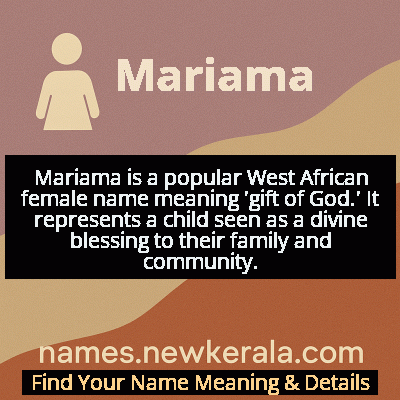Mariama Name Meaning & Details
Origin, Popularity, Numerology Analysis & Name Meaning of Mariama
Discover the origin, meaning, and cultural significance of the name MARIAMA. Delve into its historical roots and explore the lasting impact it has had on communities and traditions.
Name
Mariama
Gender
Female
Origin
African
Lucky Number
2
Meaning of the Name - Mariama
Mariama is a popular West African female name meaning 'gift of God.' It represents a child seen as a divine blessing to their family and community.
Mariama - Complete Numerology Analysis
Your Numerology Number
Based on Pythagorean Numerology System
Ruling Planet
Moon
Positive Nature
Diplomatic, friendly, artistic, empathetic.
Negative Traits
Over-sensitive, moody, indecisive, prone to self-pity.
Lucky Colours
Green, cream, white.
Lucky Days
Monday.
Lucky Stones
Pearl, moonstone.
Harmony Numbers
1, 3, 4.
Best Suited Professions
Diplomats, mediators, caregivers, artists.
What People Like About You
Cooperative spirit, friendliness, artistic talent.
Famous People Named Mariama
Mariama Bâ
Author and Feminist
Renowned Senegalese writer known for her novel 'So Long a Letter' addressing polygamy and women's rights
Mariama Diallo
Film Director
Senegalese-American filmmaker known for her critically acclaimed horror film 'Master' exploring racism in academia
Mariama Sonko
Environmental Activist
Senegalese agricultural leader and co-founder of 'We Are the Solution' campaign promoting women's farming rights
Mariama Keita
Journalist
Pioneering Malian journalist and radio broadcaster who became the first female news director in Mali
Name Variations & International Equivalents
Click on blue names to explore their detailed meanings. Gray names with will be available soon.
Cultural & Historical Significance
The name carries historical weight as it connects to the venerated figure of Maryam (Mary) in Islamic tradition, mother of Prophet Isa (Jesus), who is revered for her piety, strength, and devotion. Throughout West African history, women named Mariama have often been seen as bearers of cultural continuity, embodying both traditional values and progressive aspirations. The name has been particularly significant in post-colonial West Africa, where it represents the harmonious coexistence of Islamic faith with African identity, making it a symbol of cultural resilience and spiritual depth.
Extended Personality Analysis
Women named Mariama are often perceived as possessing a unique blend of spiritual depth and practical wisdom. They tend to be nurturing figures with strong maternal instincts, yet simultaneously demonstrate remarkable resilience and inner strength. Many Mariamas are known for their quiet confidence and ability to provide emotional support to others while maintaining their own composed demeanor. Their name meaning 'gift of God' often translates into a personality that feels blessed and seeks to be a blessing to others.
Common traits associated with Mariamas include exceptional empathy, strong moral compass, and deep family loyalty. They often serve as peacemakers in their communities, using their diplomatic skills to resolve conflicts. While typically gentle in approach, Mariamas can display formidable determination when defending their principles or protecting loved ones. Their spiritual nature doesn't prevent practical action; rather, it informs their decision-making with a sense of higher purpose. Many exhibit a balance between traditional values and modern thinking, making them adaptable yet grounded individuals who honor their heritage while engaging with contemporary life.
Modern Usage & Popularity
In contemporary times, Mariama remains a popular choice throughout West Africa and among diaspora communities worldwide. The name has maintained consistent popularity in countries like Senegal, Mali, and Guinea, where it represents both cultural pride and religious identity. Among African diaspora communities in Europe and North America, Mariama serves as a powerful connection to heritage while being easily pronounceable in international contexts. Recent years have seen the name gain recognition beyond African communities as global appreciation for diverse names increases. While not typically ranking in top baby name lists in Western countries, it maintains steady usage and is particularly cherished by families seeking names with deep spiritual meaning and cultural resonance. The name's elegance and meaningful origin continue to appeal to modern parents balancing tradition with contemporary sensibilities.
Symbolic & Spiritual Meanings
Symbolically, Mariama represents divine grace, maternal protection, and spiritual inheritance. The name evokes images of sacred gifts and blessings, suggesting that the bearer brings divine favor to their family and community. It symbolizes the bridge between heaven and earth, representing how spiritual virtues manifest in human form. In many West African interpretations, Mariama symbolizes the perfect balance between strength and gentleness, much like the biblical and Quranic Mary who demonstrated both profound faith and incredible resilience.
The name also carries symbolic weight as a representation of cultural continuity and the transmission of values across generations. It stands as a testament to the enduring power of faith and tradition in modern life, symbolizing how ancient spiritual truths remain relevant in contemporary society. For many, the name Mariama embodies the idea that every individual has a divine purpose and that feminine strength, when guided by spiritual principles, can transform families and communities. It represents the sacred in the ordinary, reminding us that everyday life is infused with spiritual significance.

